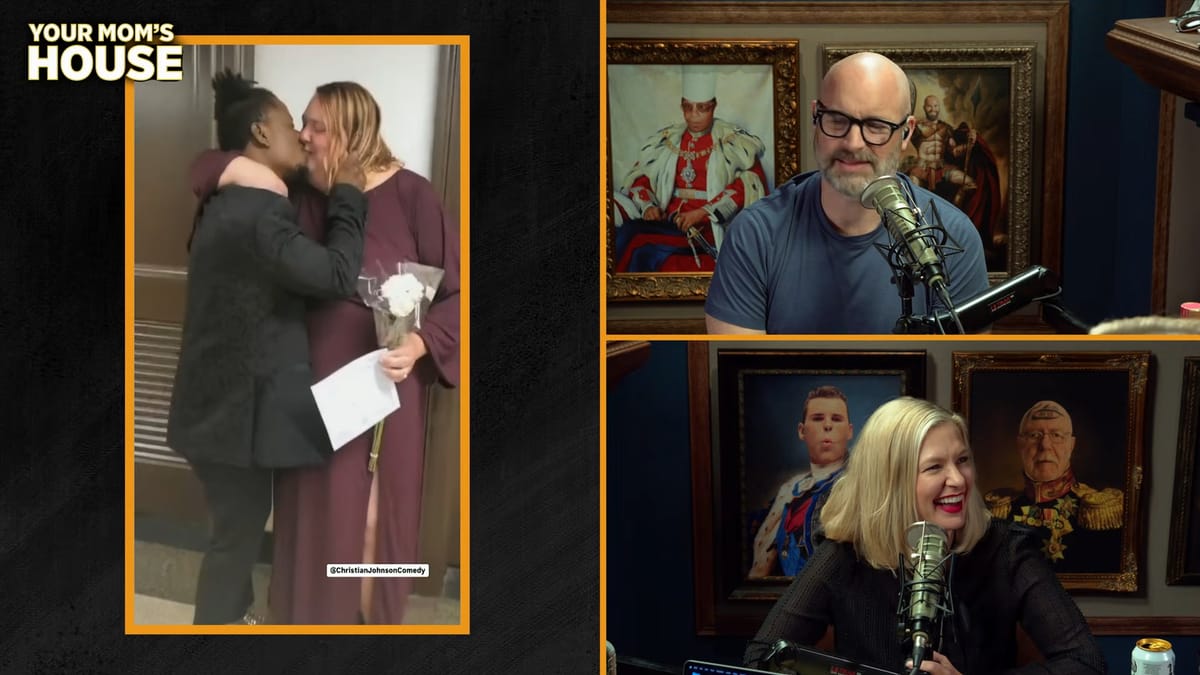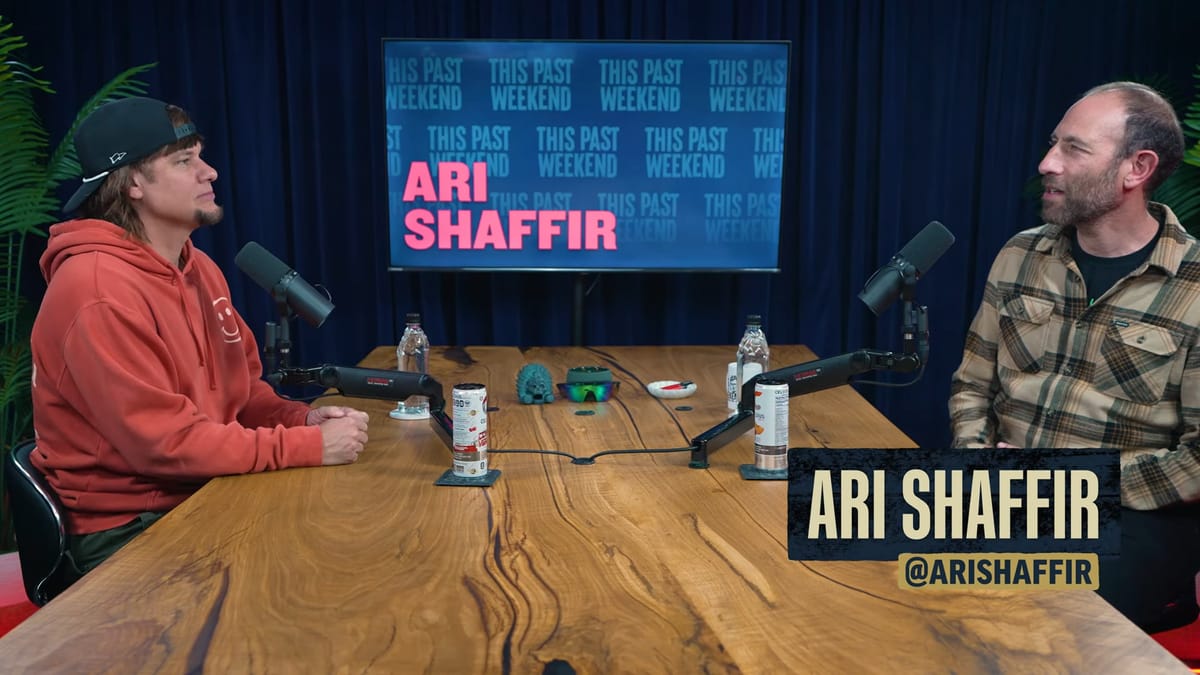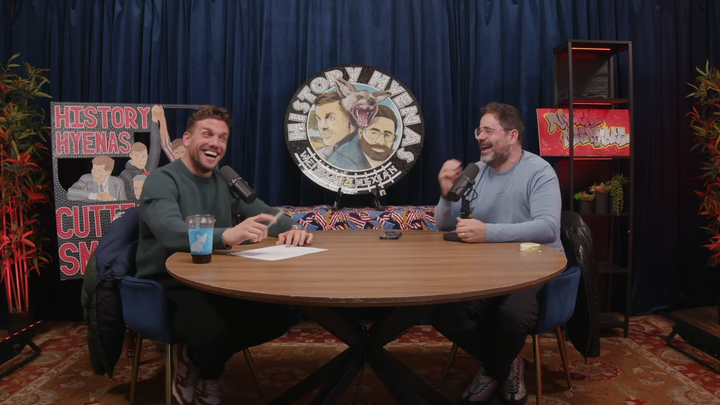The Stavros Problem
A few thoughts about my friend's favorite comedian.

My friend Michael—for whom I have great respect and esteem—is a huge fan of the comedian Stavros Halkias. Often he encourages me to consume this or that new piece of media by Halkias, and when I say no, no thank you, it’s not for me, Michael asks why, why is it not for me? Halkias, after all, is a very funny left-winger who makes no secret about his politics, contrary as they are to so many in his class of standup-podcasters. Recently he’s used his considerable platform to support Zohran Mamdani’s mayoral bid; just last month he earned glowing headlines for his firm response to transphobic comments by the comedian Jordan Jensen on his podcast. He positions himself as a woke dirtbag, and in almost every aspect of his public life he appears to live up to that positioning. What, then, is my problem?
Very conveniently for Michael and for me, this week Halkias went on the Vulture podcast Good One and answered the question himself. Transcript below and discussion to follow, but the tl;dr is this: Halkias’s politics contain an enormous carveout for his Nazi friends, and while I do not begrudge anyone else their fandom, it is a bridge too far for me, personally.
Jesse David Fox: I saw you on Blair Socci's show for her birthday she had.
Halkias: Oh, hell yeah.
Fox: And she said something to the effect of, "What does it feel like to be the last line of defense in the world of bro podcasting?" And you said, "Everyone has idiot friends. It's just that my idiot friends have millions of listeners."
Halkias: Yeah, yeah.
Fox: Which is—
Halkias: I didn't realize the show was on the record, Jesse. I was speaking freely.
Fox: But that's wild. Because we do have idiot friends and you decide, oh, does their idiotness harm the world? And you decide whatever.
Halkias: And by the way, I am also an idiot.
Fox: Sure, yes.
Halkias: Me and my idiot friends have millions of listeners, and that's fucked up.
Fox: Yes.
Halkias: We really should just be dumbass comics who have specials, but that's about it. You know what I mean?
Fox: Yeah.
Halkias: We can't just—not solidify, but you can't calcify and just be, "we are on opposite sides," because we're not, I really, truly, in my heart think it's not—you're falling for it if you cut off your friends who don't share these same beliefs with you. What they want is to divide you and your friends to destroy communities along these fake culture war lines, which ultimately, these are not, I don't think these are hateful people. I think especially when you talk about entertainment industry, I think you get swept up in a lot of stuff, and you, especially depending on how into your career you are, you want to walk a specific line. And I do think it's important to just be friends with people that have completely different thought processes as you.
Fox: To that point, I was curious, I think there are people on the internet that lump—that are not as familiar with this world, who lump everyone together. And you're on Tires with Shane and Andrew Schulz. I was curious, what do you think people misunderstand about a lot of these guys?
Halkias: I mean, it's just that you automatically think you understand these people, you know what I mean?
Fox: Yeah.
Halkias: I also think to some extent, not everybody, but it's just like, you also have to understand that some of it is persona. Some of it is—but I don't know. I just think they become avatars for what you already believe in and you don't engage with them as people. I mean, Shane's one of the best guys of all time. He's just a truly nice person who treats his friends well. I mean, he puts his friends on a fucking net—he gets a sitcom, you don't think famous people could have been at every one of those roles? But he took his friends with him. You know what I mean? That does mean something to me when he treats just anyone really fucking nicely in a way that I've seen people that are not as famous be real pieces of shit.
And I do think some people just wanna decide somebody is the dumbest thing they've ever said or put forward. And listen, you don't have to like anyone. That's the other beauty of all this shit is if you don't like someone, you don't have to listen to them necessarily. But I don't know. I don't know what they—it is difficult because on a personal level, I really try to not live on the internet. And these are my personal friends and I do have really positive views of them. And maybe I'm being naive and sticking my head in the sand and not thinking about—and maybe I am going back to a time where I really think comedians shouldn't have pull, but they fucking do. And maybe I should just admit that to myself. But other than—I don't think—these are not destructive. These guys are not the problem, I don't think.
You know what I mean? And they're funny. And as human beings, good guys. And that is important to me just on a personal level. And I think to not go insane, that is how I have to look at things. And again, like I said, there's a line. There is like if you're outwardly fucking racist, whatever bootlicking, whatever the fuck, I'm sure there's a line with everybody in their personal relationships. But these are just... That's the problem, is that people just put their own beliefs onto these guys, I think. And it's not saying you have to watch hours of their stuff, but, you know.
Conceding my bias as someone who spends a great deal of time listening to and thinking about right-wing comedians, I think Halkias is completely delusional here: podcasters in the Gillis and Schulz crowd are not putting on personas when they enthuse over Donald Trump or rant about immigrants or make racist or homophobic jokes or call people slurs or hang out with Nazis and Holocaust deniers. Nor do these tendencies represent “different thought processes” unjustly politicized by culture warriors; they are genuine ideological commitments, for which the likes of Schulz and Gillis (and Joe Rogan, Theo Von, Tim Dillon, et cetera, et cetera…) advocate in plain speech. They may not always say hateful things hatefully—they sometimes do—but that doesn’t make those things any less hateful. For that matter, they are also “outwardly racist” bootlickers who spent the 2024 election season promoting Donald Trump, JD Vance, and Robert F. Kennedy Jr. If one believes those politicians are destructive, then one cannot so easily dismiss the idea that their boosters are, too. This is how media works; it’s the cultural role these people have all willingly claimed.
Halkias suggests you’d have to “watch hours of their stuff” to understand that his friends aren’t what people like me say they are. This is exactly backwards: you have to not watch their stuff in order to believe they’re anything else. As I think I’ve made very clear in this newsletter, the Rogan crowd is absolutely not subtle about their beliefs, and they have only grown more and more brazen over the last half-decade. It is insultingly naive to imagine that because they are kind to their friends, the words they say to their millions of fans have no negative impact on the world. Halkias is smart enough to recognize the obvious flaw in this reasoning; plenty of bad people are kind to their friends and allies.

Similarly naive is Halkias’s wish that comedians could just be comedians. Nobody in the world is just anything; we all live in highly politicized environments, be they our homes or our workplaces or mass media ecosystems. Setting aside the fact that comedians are by definition social commentators, Halkias and his friends have themselves chosen to pursue positions of fame and influence, and to use those positions in the furtherance of their own ideological objectives. Shane Gillis chose to become Bud Light’s olive branch to transphobes after the Dylan Mulvaney controversy; Andrew Schulz chose to host and vote for Donald Trump, defend ICE, and call for more illegal deportations to concentration camps in El Salvador; Chris Distefano, with whom Halkias hosted Tom Segura’s podcast 2 Bears 1 Cave over the summer, chooses to unleash a more or less constant stream of unbelievably racist shit on his own podcast basically every week; so does Segura, if you sub out “racist” for “homophobic and transphobic and also racist.” These people are all adults. None have gotten “swept up” in anything but their own careers.

Why does any of this matter? Because, unfortunately, everything matters. The world is real and it is bad and getting worse, and there is simply no time to waste on old arguments about whether people with influence have any duty to use it well. They do, and they are especially responsible for using it well in the domains where it might have the most impact: their personal lives. You and I have basically no hope of changing Shane Gillis’s mind; his friends, at least, have some hope, whether through persuasion or outright repudiation. Much as I found it unsatisfying when Marc Maron said he still extends collegiality to the likes of Tony Hinchcliffe—and much as I find myself dismayed by basically every left-of-center comedian’s willingness to make nice with the Nazis in their midst—I find myself disappointed in Halkias’s refusal to see what’s right in front of him, let alone do anything to change it.
Perhaps it’s unfair that his positioning as a nice cool guy with good politics only heightens the few areas where he fails to live up to them; well, tough shit. We’re ruled by fascists and they’re trying to kill us. If you can’t draw a line against the ones in your own community, why should I trust you to stand against them anywhere else?
But like I said—I don’t begrudge you or Michael or anyone else their enjoyment of Halkias’s work. He’s very funny and seems like a fine dude. I'd love it if he proved me wrong.


